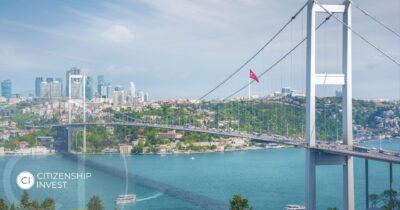

Positioned at the crossroads of Europe and Asia, Turkey offers a unique blend of strategic location, robust economic growth, and diverse investment opportunities that have piqued the interest of High-Net-Worth Individuals worldwide. Against this backdrop, its Citizenship by Investment (CBI) program has become a powerful tool for global investors seeking financial returns and flexibility.
What Sets Turkey’s CBI Program Apart?
Turkey’s Citizenship by Investment (CBI) program was launched in January 2017 to attract forward-thinking investors by offering a combination of accessibility and a range of benefits. The program encourages foreign direct investment and supports the growth of the country’s real estate sector by allowing investors to obtain Turkish citizenship and an irrevocable Turkish passport without the need to reside in the country or relinquish their current nationality.
To qualify, investors must make a real estate investment of at least USD 400,000. The processing time for obtaining Turkish citizenship is particularly straightforward and typically ranges from 2 to 5 months. After that, passport holders enjoy visa-free access to 111 countries, including Japan, South Korea, Singapore and a majority of countries in the Middle East. The program also extends to family dependents, including spouses and children under 18. Turkish passports are valid for ten years for individuals over 16 and five years for children under 16.
Rising Demand and Global Interest
Recently, there has been growing interest in the Turkey CBI programme. Firstly, the Turkey passport has steadily grown with its citizens gaining visa-free access to 111 destinations. This increase in global mobility highlights the growing appeal of Turkey’s Citizenship by Investment Program, offering wealthy investors the chance to expand their global reach, improve their lifestyle, and access business opportunities, better living standards, and private healthcare and education, all while retaining their original nationality.
Turkey also boasts a diverse economy, ranking as the 17th largest globally by GDP. Its strategic position between Europe and Asia facilitates trade and investment opportunities. Turkey has shown resilience and has achieved steady economic growth over the years. The government has introduced reforms to improve the business environment, reduce bureaucracy, and encourage innovation, attracting significant investment and strengthening the country’s financial stability and growth potential.
An Economic Revival Driven by Automotive and Real Estate Industries
The strong economic growth potential that has compelled the surge in the citizenship investment programme has continuously defied expectations over the past few years, showcasing a robust 5.1% growth in 2023, surpassing initial estimates. The country attracted $266.9 billion in FDIs between June 2003 and 2024, with its share of global direct investments rising from 0.2% pre-2003 to 0.9% in 2003-2023. The government’s ambitious goal is to increase this share to 1.5% by 2028, demonstrating its commitment to attracting international investment.
A growing focus on automotive and real estate industries drives this. The electric vehicle (EV) sector is experiencing rapid growth, highlighted by a $1 billion investment from Chinese manufacturer BYD, which is expected to create thousands of jobs and establish Turkey as a key player in the global EV market. The real estate sector is also thriving, with significant year-on-year increases in house prices in major cities like Istanbul, Ankara, and Izmir. Additionally, the rental market offers promising returns, making Turkish property attractive for investors seeking rental income.
According to IMI Daily, Russians, Iranians, and Iraqis are among the top foreign investors in Turkey’s Citizenship by Investment property market. Since Turkey lifted its restrictions on foreign real estate purchases in 2012, foreign buyers have acquired 384,519 homes, as the Turkish Statistical Institute reported. The Ministry of Environment recently revealed that between 2018 and 2021, 19,630 foreigners gained citizenship by purchasing 30,358 properties, with up to three out of four foreign buyers acquiring real estate as part of an application for Turkey’s citizenship by investment program.
Embracing Sustainable Solutions and High Technology
Turkey has seen a notable increase in renewable energy investments owing to supportive measures, such as feed-in tariffs, tax incentives, and streamlined permitting processes. The country also embraces sustainable solutions across solar, wind, and hydroelectric power to meet growing energy needs and reduce environmental impact. Renewable energy projects, including solar and wind farms, play a key role in advancing Turkey’s sustainability initiatives, making it an appealing destination for environmentally conscious residents and investors.
Another notable sector poised for growth within Turkey is high technology. In 2024, President Recep Tayyip Erdoğan launched the High Technology Investment Program (HIT-30), dedicating USD 30 billion in incentives to position Turkey as a global leader in high technology. The program focuses on key sectors such as electric vehicles, battery production, semiconductor manufacturing, and energy technology. Essentially, the leadership aims to boost the country’s economic and technological independence as part of Turkey’s goal of becoming a regional hub for battery production, offering a USD 4.5 billion incentive package to attract international investors and aiming to secure USD 20 billion in private sector investments to enhance the nation’s capabilities further.
Take the Next Step
Now is the time to seize the advantages of Turkish citizenship. With its blend of modern infrastructure, rich heritage, and unparalleled market access, Turkey is not just an investment destination—it’s a gateway to a world of opportunities.
Contact Citizenship Invest today to learn more about Turkey’s Citizenship by Investment program. Let our team of experts help you unlock your potential with this transformative opportunity.